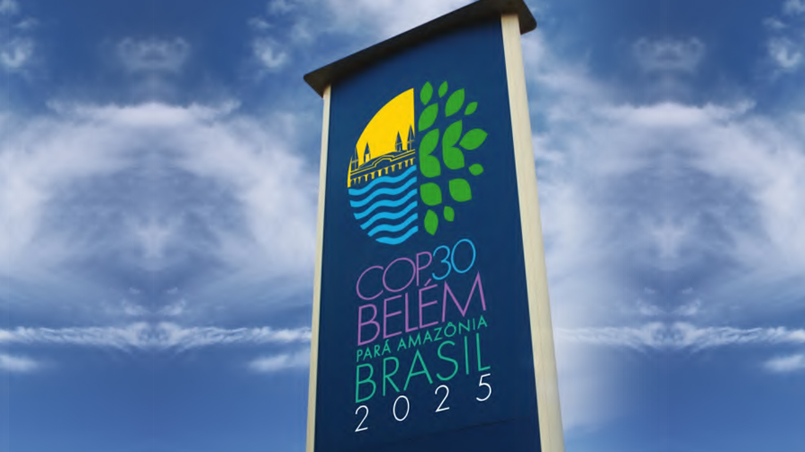Bridging Global Pledges and Local Realities

Strategic Guidance for Business Leaders ahead of COP30
As the global community steadily approaches the landmark COP30 summit in Brazil, hopes are high, and expectations are mounting on governments, corporations, and civil society to demonstrate credible progress on climate commitments. The 2025 conference represents a pivotal inflection point - when nations must submit enhanced Nationally Determined Contributions (NDCs) aligned with the critical 1.5°C pathway, especially when the present measurements indicate that the global average temperature has already risen by approximately 1.45°C to 1.6°C above pre-industrial levels. According to the UNFCCC's Global Stocktake, current trajectories place us closer to 2.5°C, with disproportionate impacts on vulnerable communities and ecosystems. The stakes are higher than ever: the first Global Stocktake reveals the distance between ambition and achievement. The credibility of multilateral climate action now hinges on closing the persistent gap between lofty international pledges and the practical realities of local implementation.
For business leaders, COP30 represents both a test and a strategic opportunity. The test lies in proving that sustainability commitments are not merely aligned with high-level pledges but are being translated into measurable, verifiable impact on the ground. The opportunity lies in influencing policy, steering market transitions, and securing long-term competitiveness by embedding climate action at the very heart of strategy.
Learning from the Gaps
The journey from Paris (COP21) to Dubai (COP28) has underscored both the promise and the limitations of multilateral climate negotiations. The Paris Agreement established a historic framework for collective action and successive COPs advanced key agendas such as the Global Stocktake, the Loss and Damage Fund, and the call to transition away from fossil fuels. Yet, implementation has consistently lagged ambition.
Persistent gaps remain:
• Action-Ambition Mismatch: Current NDCs have failed to get to the 1.5°C trajectory, with many countries missing interim targets or offering conditional pledges dependent on finance.
• Finance Shortfall: The long-promised USD 100 billion per year in climate finance from developed nations has been delayed and remains fragmented.
• Adaptation Deficit: Despite mounting climate impacts, adaptation funding and technology transfer remain inadequate, leaving vulnerable regions exposed.
• Implementation Challenges: Even where policies exist, weak enforcement, inconsistent reporting, and limited alignment of national plans with local realities hinder progress.
Unlike earlier COPs that focused on setting ambition, COP30 is a 'Delivery COP'-the defining moment when countries must present enhanced Nationally Determined Contributions (NDCs) reinforced by concrete, actionable plans. Brazil's role as host will also bring nature and biodiversity to the forefront, with the Amazon rainforest symbolizing the inseparable link between climate stability and ecosystem protection.
Unlike earlier COPs that focused on setting ambition, COP30 is a 'Delivery COP'-the defining moment when countries must present enhanced Nationally Determined Contributions (NDCs) reinforced by concrete, actionable plans.
India's Critical Role in the Global Transition
India, the world's third-largest emitter yet one of the lowest per-capita emitters, sits at the heart of this global transition. With ambitious targets net zero by 2070, 500 GW of non-fossil fuel by 2030, and a projected USD 10 trillion investment need for decarbonisation India embodies the challenge of aligning development imperatives with climate goals. India has already achieved two of its five climate goals, as outlined in its updated Nationally Determined Contributions (NDCs) under the Paris Agreement. India has surpassed its commitment to achieving at least 50% of its cumulative electric power installed capacity from non-fossil fuel sources by 2030. As of July 2025, the country's non-fossil fuel capacity has already reached over 50%. This includes a mix of renewable energy sources such as solar, wind, and hydropower, along with nuclear power. India has also successfully reduced the emissions intensity of its GDP by over 45% from 2005 levels. These achievements were met well ahead of the 2030 deadline.
L&T: An Indian Case Study in Bridging the Gap
L&T, India's leading engineering and infrastructure conglomerate, offers a compelling example of how corporations can align global ambition with local realities. L&T has set bold targets:
• Carbon neutrality by 2040, way ahead of India's national net-zero timeline and achieved 28% reduction in emission intensity w.r.t baseline year FY2020-21.
• Water neutrality by 2035, a critical goal in a country acing acute water stress.
• Target of 55% by FY 2025 26 and over 53% of FY2024-25 revenue already derived from green businesses such as renewables, water management, and energy efficiency solutions.
L&T has embedded sustainability deeply across its operations and value chain-transitioning to renewable power through longterm power purchase agreements, adopting biofuels, reducing fuel consumption through innovative energy efficiency solutions, expanding circular economy practices, and pioneering sustainable construction practices to lower the carbon footprint in the process. Extending its commitment beyond organizational boundaries, L&T actively engages critical supply chain partners to integrate ESG principles into their own business practices. Exemplifying site-level action with global relevance, the company's 750-acre Hazira facility has achieved plastic-free status, while largescale water conservation initiatives have saved approximately 3.2 million kilolitres in FY2024-25.
India has surpassed its commitment to achieving at least 50% of its cumulative electric power installed capacity from non-fossil fuel sources by 2030. As of July 2025, the country's non-fossil fuel capacity has already reached over 50%.
L&T's approach highlights a key insight for business leaders: global targets gain traction and credibility only when they are translated into measurable local actions, supported by innovation, investment and governance.
A Roadmap for Business Leaders
The lessons from India and L&T offer a strategic blueprint for companies preparing for COP30:
• Localise Global Commitments: Break down net-zero or science-based targets into site-specific milestones, assessing emissions intensity across plants, projects, and supply chains to create clear decarbonisation pathways.
• Engage in Policy Co-Creation: Participate in state and national climate dialogues, offering technical expertise to shape effective carbon pricing, adaptation measures, and enabling regulations that are implementable and practical.
• Advance Nature-Positive Strategies: Adopt regenerative materials, restore degraded land, and invest in water stewardship, aligning with COP30's expected focus on forests and biodiversity.
• Strengthen Measurement and Assurance: Align with global standards such as ISSB and India's BRSR, and secure third-party assurance to build investor confidence.
• Unlock Finance for Just Transitions: Tap into green bonds, sustainability-linked loans, and blended finance to accelerate decarbonisation while supporting workforce reskilling and community development.
The Leadership Imperative
The central lesson as COP30 approaches is clear: global ambition is meaningless without tangible local action. Indian businesses are uniquely positioned to bridge this gap, combining the scale of emerging markets with the innovation and adaptability demanded by a climate constrained world. Companies like L&T have demonstrated that embedding sustainability is not philanthropy but strategy-driving efficiency, resilience, and long-term value creation. Those who follow suit will not only help India meet its national commitments but also shape global pathways to a just and sustainable future. By translating pledges into place-based strategies, engaging policymakers, investing in nature positive solutions, strengthening transparency, and financing just transitions, Indian businesses can ensure that the promises made in global forums become real, regenerative change in every community they touch.
Author

Mr. Santosh Kumar Singh
He is a seasoned sustainability leader with a proven track record of driving impactful ESG initiatives. As the Chief Sustainability Officer at Larsen & Toubro Limited (L&T), he spearheads the company's sustainability strategy across diverse sectors, including engineering, construction, manufacturing, and technology services. Prior to joining L&T, Mr. Singh served as the CSO for three energy companies within the Adani Group: Adani Power, Adani Green Energy, and Adani Energy Solutions.
Owned by: Institute of Directors, India
Disclaimer: The opinions expressed in the articles/ stories are the personal opinions of the author. IOD/ Editor is not responsible for the accuracy, completeness, suitability, or validity of any information in those articles. The information, facts or opinions expressed in the articles/ speeches do not reflect the views of IOD/ Editor and IOD/ Editor does not assume any responsibility or liability for the same.

 Quick Links
Quick Links
 Connect us
Connect us




 Back to Home
Back to Home































